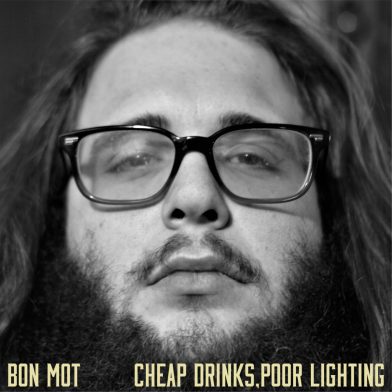 The simultaneous presentation of high and low fidelity permeates the debut solo release of MC Bon Mot, one-third of a group of underground local rappers and hip-hop producers called Proper Channels. Evident from the very beginning in the intentional scratchiness and vinyl-like warmth of the first track, Cheap Drinks, Poor Lighting instantly reminds one of the conscious alternative releases of the early 1990s. Indeed, the jazz and funk-influenced production of this record are not dissimilar from A Tribe Called Quest’s famous masterpiece, The Low End Theory. Neither is the consistently slow, greasy, resolutely lazy flow of the raps and the tracks containing them, and by extension the attention drawn to the content of the words. His choice of stage name is an invocation of itself, bon mot an obscure way to express a witty remark. And witty he is.
The simultaneous presentation of high and low fidelity permeates the debut solo release of MC Bon Mot, one-third of a group of underground local rappers and hip-hop producers called Proper Channels. Evident from the very beginning in the intentional scratchiness and vinyl-like warmth of the first track, Cheap Drinks, Poor Lighting instantly reminds one of the conscious alternative releases of the early 1990s. Indeed, the jazz and funk-influenced production of this record are not dissimilar from A Tribe Called Quest’s famous masterpiece, The Low End Theory. Neither is the consistently slow, greasy, resolutely lazy flow of the raps and the tracks containing them, and by extension the attention drawn to the content of the words. His choice of stage name is an invocation of itself, bon mot an obscure way to express a witty remark. And witty he is.
Samples drawn from the catalogue of deep cuts and rare grooves are sprinkled throughout and employed cleverly: a melody from trumpeter Freddie Hubbard, the presence of Herbie Hancock’s bass player Paul Jackson, the Ohio Players’ “Alone” over a track about independence, even a vocal melody from a 1936 recording of Ella Fitzgerald. The latter is used to greatest effect, as the chorus of a track to emphasize the focus on the promise of future hope belying the hardships of one’s current situation, ending with all of Proper Channels’ rappers singing (rapping?) along with Ella at the top of their lungs: “The stars above have promised to meet us tomorrow… Till then my love, how dreary the new day will seem.”
A lot of the lyrics seem preoccupied with the anxiety of coming up lower or lower-middle class, with unadorned phrases like “spend nights working on a version of a new track, wishing I was better at the only thing I’m good at” cutting to the bone. The underlying motif of revering and respecting while subverting, and the scintillating wordplay and reversals (“but with perfection comes practice”) are what make this album so coherent and charming, be it usage of a thematically resonant jazz track from almost a century ago, or assertions concurrently tongue-in-cheek and rooted in truth. The consistency in cleverness of this record, be it from the production or lyrical perspective, make it a must-listen for fans of contemporary underground New Orleans hip-hop.



